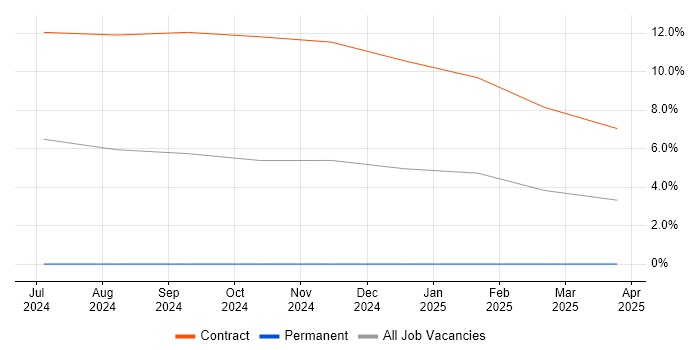PySpark - Spark Python API
Berkshire > Windsor
The table below provides summary statistics for contract job vacancies advertised in Windsor requiring PySpark skills. It includes a benchmarking guide to the contractor rates offered in vacancies that cited PySpark over the 6 months leading up to 1 May 2025, comparing them to the same period in the previous two years.
| 6 months to 1 May 2025 |
Same period 2024 | Same period 2023 | |
|---|---|---|---|
| Rank | 14 | - | - |
| Rank change year-on-year | - | - | - |
| Contract jobs citing PySpark | 7 | 0 | 0 |
| As % of all contract jobs advertised in Windsor | 11.67% | - | - |
| As % of the Libraries, Frameworks & Software Standards category | 28.00% | - | - |
| Number of daily rates quoted | 3 | 0 | 0 |
| 10th Percentile | £425 | - | - |
| 25th Percentile | £453 | - | - |
| Median daily rate (50th Percentile) | £500 | - | - |
| 75th Percentile | £504 | - | - |
| 90th Percentile | £506 | - | - |
| Berkshire median daily rate | £503 | £319 | £600 |
| % change year-on-year | +57.65% | -46.88% | -4.00% |
All Software Libraries and Frameworks
Windsor
PySpark falls under the Software Libraries and Frameworks category. For comparison with the information above, the following table provides summary statistics for all contract job vacancies requiring technical specification, industry standards, software libraries and framework skills in Windsor.
| Contract vacancies with a requirement for technical specification, industry standards, software libraries and framework skills | 25 | 1 | 3 |
| As % of all contract IT jobs advertised in Windsor | 41.67% | 2.44% | 23.08% |
| Number of daily rates quoted | 18 | 1 | 2 |
| 10th Percentile | £455 | - | - |
| 25th Percentile | - | £475 | £425 |
| Median daily rate (50th Percentile) | £500 | £500 | £450 |
| Median % change year-on-year | - | +11.11% | -12.20% |
| 75th Percentile | £506 | £525 | £475 |
| 90th Percentile | £591 | - | - |
| Berkshire median daily rate | £500 | £525 | £550 |
| % change year-on-year | -4.71% | -4.55% | +7.32% |
PySpark
Job Vacancy Trend in Windsor
Job postings citing PySpark as a proportion of all IT jobs advertised in Windsor.

PySpark
Co-occurring Skills and Capabilities in Windsor by Category
The follow tables expand on the table above by listing co-occurrences grouped by category. The same employment type, locality and period is covered with up to 20 co-occurrences shown in each of the following categories:
